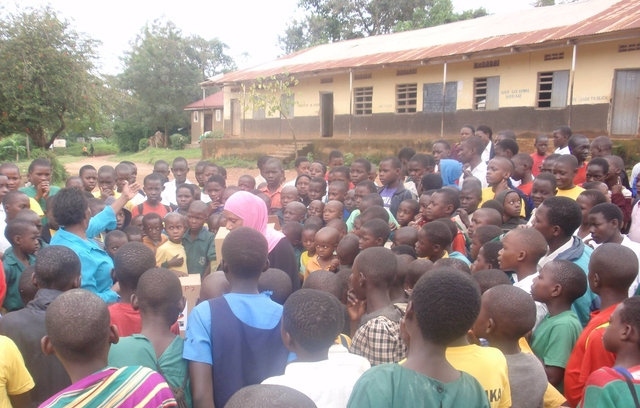Ms. Nageeba Hassan has been at the forefront of the implementation and training on the Learning to Live Together Programme in Uganda, reaching children, parents, and teachers through Restoring and Empowering Communities (REC), an organization that she co-founded in 2004.
A teacher by profession, she has expertise in the fields of counseling, positive parenting, meditation, negotiation, interreligious dialogue, and intercultural learning. Her hard work and passion have taken her to many countries, training teachers and educators on ethics education for children, and speaking about interfaith collaboration. Her persistency and drive have helped her make real changes in the lives of many children in Uganda, their families, and their communities.
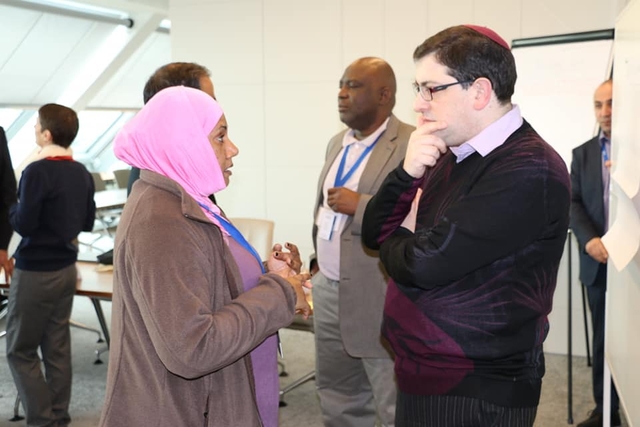
Ms. Hassan is a Learning to Live Together Trainer, a KAICIID Fellow, and a member of the African Woman of Faith Network, the International Woman Coordinating Committee of Religions for Peace, and the Women of Faith in Uganda.
Learn more about her journey in the following interview.
- Tell us about you, and your story.
I was born a Muslim and I love and practice my religion. At the same time, I peacefully co-exist with everyone. Both my parents passed on (May Allah grant them the best Janah). I have lived in 4 districts of Uganda (Iganga, Jinja, Kampala, and Wakiso) but I have been to most parts of the country. Uganda is in East Africa and borders DRC, South Sudan, Rwanda, Tanzania, and Kenya. The ‘Pearl of Africa’ is a must-visit country with good hospitable people.
My mummy, my inspiration in everything I do, didn’t go to school but wanted and supported my education. My dad, on the other hand, didn’t believe in girls going to school because they are supposed to get married to rich men and get pampered. I don’t blame my dad, that’s what he believed in culturally.
I had to go to a school away from home and lived with my uncle and his family for 5 years. He believed in corporal punishment and would beat us frequently. I once told my mother and she talked to him, but when she left he beat me for telling her, so I didn’t report again until after I left his home. The cane marks were very visible so I decided to wear long stockings and sweaters or jackets to cover them. That way I didn’t have to give explanations. This went on long after leaving his home thinking the cane marks were still showing (psychologically I felt them). I forgave him.
My mother was very sad when I told her about my life at my uncle’s place. She said I should have told her because she had promised that if I was beaten again she would take me back home and to another school. I guess I have turned childhood challenges into opportunities. That’s one of the reasons I founded Restoring and Empowering communities (REC) as a community-based organization (CBO) based on voluntary service in 2004. Together with friends and family, we reached out in different ways to communities. In 2014 we registered REC as a CBO and later we upgraded it to a non-government organization (NGO).
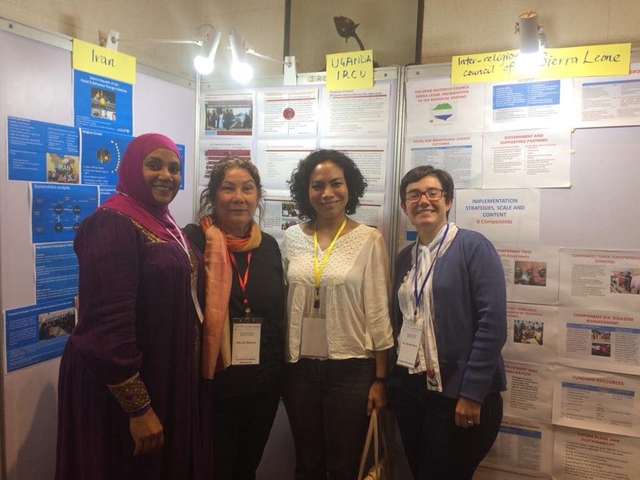
- Thank you for sharing about those difficult times, and how you turned that experience into an opportunity to helping others. Tell us about your journey with ethics education. How did you get to know Arigatou International?
I went to University to get a degree in Education and later a master’s in Peace and Conflict Studies at Makerere University. In between, I received several certificates and fellowships in all the fields I enjoy working in. The one I appreciate the most is my certificate on ethics education for children
I taught at the Aga Khan Primary School with a child-centered approach for 8 years and then started doing community work with children, parents, and teachers on positive parenting to prevent HIV/AIDS.
I moved into the religious circles and worked with the Muslim community through the Uganda Muslim Supreme Council (UMSC). There, with the support of grand mufti Shk. Shaban Ramadhan Mubaje and the Secretary-General Shk. Engineer Siraji Zaid Kavuma I formed the Muslim Women’s Desk, the first women structure that would work alongside that of men, which was finally promoted to a full department.
Later in the Interreligious Council of Uganda, working closely with the strongest team of women of faith -Sister Goretti Kisakye (RIP), Ms. Sarah Kasule (RIP), Ms. Florence Kwesigabo, Ms. Despina Namwembe, Ms. Gladys Nalubega, Ms. Esther Nakisige, Ms. Rose Ssegujja, Ms. Aisha Ssemakula, Ms. Mariam Naava and Ms. Hafswa Mutebi) with the full support of the Secretary-General Dr. Kitakule Joshua and the top religious leaders, we formed the National Coordinating Committee that I have chaired from 2014-2019 (UWOFNET). Currently, I’m one of the regional coordinators for the African Women of faith network with the African Council of religious leaders (AWFN-ACRL) and I seat on the International women coordinating committee with Religions for Peace (IWCC-RfP)
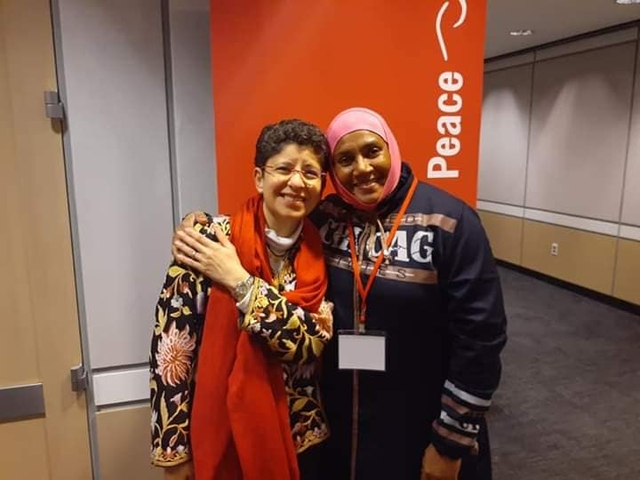
In 2013 I was invited to participate in the 9th World Assembly for Religions for Peace International that was hosted by KAICIID in Vienna. It was there where I first heard of Arigatou International and their work for children. I was very interested in it and I reached out to Dr. Mustafa Ali. The following year I was invited to Nairobi for a basic training workshop in ethics education for children, using the Learning to Live Together Programme. Learning to Live Together is like a holy book in all my work. I have since been trained as a Trainer in France and I was lucky to be trained online on the Ethics Education Approach, Building Safe and Inclusive Learning Environments for Children, and Monitoring and Evaluation. I also took part in the recent training for teachers to respond better during lockdown situations and school closures.
I co-facilitated Learning to Live Together workshops with other international Trainers in Mauritius for teachers and lecturers, in Tanzania for teachers working in Peace Clubs, and in Kenya for educators, managers and planners working at the Kenya Institute of Curriculum Development.
I have since integrated Learning to Live Together in all my work in schools. The children from the Book Club that I’m guiding, over time and practice, have been encouraged to come up with their own initiatives to address different issues in their schools. We have carried out campaigns on antibullying and hygiene among others. We also organized intergenerational dialogues with adults and stakeholders including teachers, parents, government officials, religious, cultural and opinion leaders, and elders on issues that concern them like child abuse especially corporal punishment and child sexual abuse and exploitation. We have been able to reach out to over 30,000 children directly and much more indirectly. This has been supported by Arigatou international, the schools themselves, Niteo Africa Society, KAICIID Dialogue Center and the Embassy of the United States.
We have carried out workshops on the Ethics Education Approach to help find alternatives to corporal punishment, and promote child-friendly methods of teaching, child protection, and basic counseling. We have worked with over 2,000 teachers in 70 schools supported mainly by the schools themselves.
The children in my country, like most children around the world, face challenges and abuse ranging from physical, sexual and emotional abuse. In this time, I have been able to work mostly around prevention, referral and psycho-social support. Children have dropped out of school due to different reasons like abuse both at school and home, poverty and parental neglect. We have child-headed families and many vulnerable children who have been forced into child labor, child marriages, and child trafficking among others. We work with parents, guardians, teachers, elders, and leaders to build safe environments for children.
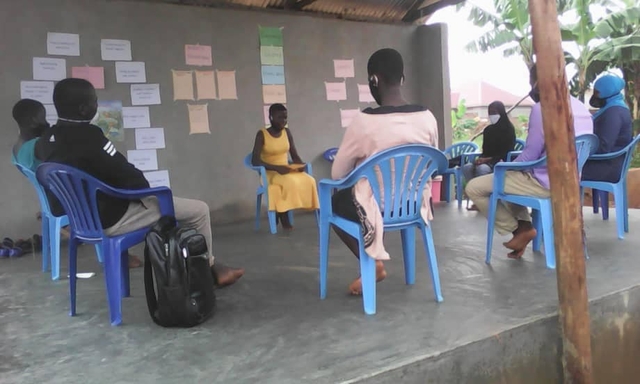
- What challenges have you faced while working with children in vulnerable contexts?
Like any work, there are some challenges that we face especially in informal education.
In my country, teachers take the exam-oriented approach to finish the syllabus. This cuts back on any extracurricular activities. As a stand-alone program, it can be hard to have a buy-in unless one has established a long-term relationship with the school, and even so, sometimes the management changes, and the new team scraps off all that was built.
- ¿Do you have any advice for those trying to carry our programs based on Learning to Live Together?
My advice is using the Learning to Live Together Programme to have a long-lasting impact on topics like child protection, child abuse and exploitation, peacebuilding, prevention of violent extremism, poverty, harmful cultural rituals, civic education, solidarity, environment, life planning skills, positive parenting and learning for life among others. If we manage to integrate ethics across all the thematic areas, you will enjoy your work and get maximum results. Make ethics education your core in anything to be done, put it on the dialogue table, and get buy-in for it.
Funding is critical. We need to partner with schools and parents. Involve and engage them so they are aware of what’s happening at all times and they will fully support the children. Get their consent for different sessions that you feel will need to share photos and or have children participate outside the school or will involve people from other schools and organizations. Consent protects the children, you, and everyone. From our feedback, both parents and schools are impressed and appreciate how the children changed in behavior, attitude, and above all improved performance at school.
Ethics education is very important in everyone’s life and I strongly believe that if we all had it in our school’s curriculum, the world would be different today. Ethics education gives meaning to the term lifelong learning. The approach used allows growth, continuous learning, and helping others around you. Today the schools are exam-oriented with crush programs to complete syllabuses. The ethics education approach is an excellent tool to facilitate learning because it’s not only child-centered learning but engages the teacher and children right from the start. Children who are lucky to have ethics education have greatly improved their performance in academics and interpersonal skills. It allows the children to inquire, question, reflect, dialogue and think critically.
Ethics education calls for a good role model who motivates children to learn more, even if it is on their own, and moves them to understand themselves in relation to others and see themselves in the bigger picture of their communities. Ethics education gives spaces for peer learning and encourages collaboration towards a common concern as a collective responsibility to transform their communities. Children have the opportunity to learn how to be more empathetic, respectful, responsible and that can find reconciliation in nonviolent ways. Ethics education helps both adults and children to grow as individuals and live more ethically as a group, family, or community. The children are in a better position to make informed decisions and this will help them to prevent any form of injustices around them as children and later as leaders because they have the skill to reflect and think more critically.
Currently, with the pandemic and the schools being closed, we have changed our operation area to families, working closely with local leadership and Town Council Officials. We have a child/youth-led initiative that we have called Caring Communities. Through Caring Communities, children have mobilized 70 homes with 220 children and youths. We fundraised through a book sale, to build a safe space to offer free services to the community. ¡We got a good response!
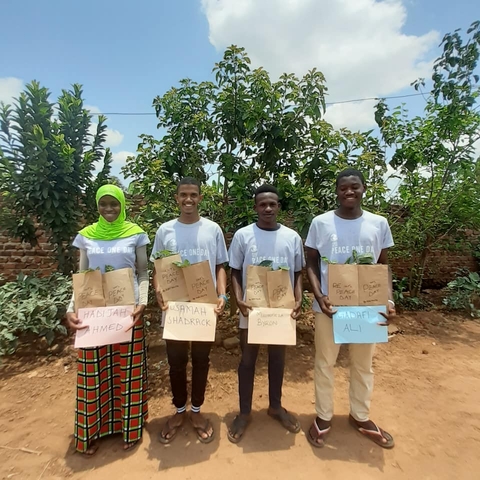
Ms. Hassan and the children from Caring Communities have been working together throughout the COVID-19 Pandemic. They have raised funds to provide a safe space for their community to receive help, engage in dialogue with local authorities, and participate in workshops. They have carried out informative sessions to educate families on the hygiene measures required to prevent the spread of the virus and provided food and essential hygiene products. Also, Ms. Hassan has been able to carry out workshops on ethics education with a focus on empowering youth and fostering their participation.
We thank Ms. Hassan for working together with Arigatou International with such drive and passion, and her commitment to furthering children’s rights and wellbeing. We admire her groundbreaking work in interfaith learning and collaboration, in contexts where prejudice and divides were hindering dialogue and partnerships. She is a role model to many children and youth in her community, and an inspiration for all those working to build a better world for children.
